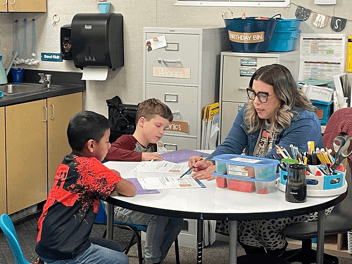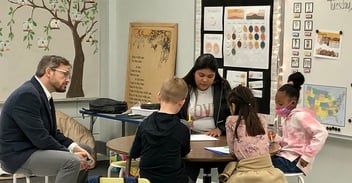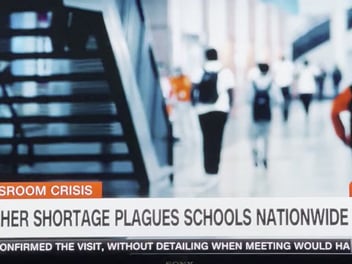Working Adult Learners & Degree Attainment: Key Insights from Candidate Success
In four short years, Reach has ensured nearly 150 adult learners, based in communities spanning from rural to urban to major metros, can persist to complete a rigorous, on-the-job undergraduate program - with an additional 1,500 adult undergrads closely behind.
Understanding this undergraduate demographic shift, U.S. colleges continue to grapple with the question: How can we best support all adult learners in overcoming the historic hurdles to degree completion?
An adult learner has a particularly challenging set of ongoing college hurdles, balancing full-time college, full-time work, and full-time family obligations.
At Reach, we see the realities for an adult learner each day. As of Spring ‘24, the average age of a Reach undergraduate is 37 years old, with learners spanning through their 50’s, 60’s and 70’s. Beyond age, 90% of Reach’s undergraduates are single working parents, first-generation college students and/or from low-income families, and 100% are working full-time as they complete their degree program.
Despite these factors, Reach is witnessing 97% retention from one semester to the next. How is Reach exceeding traditional persistence and retention standards? Beyond the benefits of an Apprenticeship Degree, the answer comes down to effective adult learner support.
Reach’s Senior Vice President of Candidate Success Ko Kim, and her team share their top four greatest levers to support and advise working, college-going adults effectively.
1. Consistently caring, candid, and quick advisor communications are key.
Beyond working full-time at a school, a majority of Reach’s candidates are often caregiving for children and/or elderly family members as they complete their Reach undergraduate program, and in many cases, working multiple jobs. These obligations are compounded by a decades-long gap since many were last enrolled in college, causing an overarching sense of imposter syndrome and struggles to get back into the rhythm of intensive coursework.
Accordingly, Candidate Success has found that coaching tactics have to be caring, candid, and quick - consistently. And Reach must meet the learner where they feel most comfortable communicating, so advisors use a mix of emails, text messages, phone calls, Zoom hangouts, Facebook groups, and more to engage candidates.
Beyond tailored communications, a data-informed engagement strategy has enabled high-touch support of each learner. This translates to understanding the holistic picture: ‘Is this candidate in the right program?’ to the minutiae: ‘Hey! This candidate met their assignment goal! I’m texting them now to celebrate!”
“It always seemed when I would start to get overwhelmed with school work, my advisor Nicole would email or text to check in on me. It was like she knew when I needed that extra support or push to keep going.” - Reach undergraduate.
2. Embedded advisor engagement removes the shame in asking for support.
78% of Reach candidates are returning college or transfer students. When college didn’t work in the past, it's natural to feel ashamed or embarrassed to ask for help when falling behind or encountering a challenge. And in so many cases, this shame is triggered by a deeper K-12 experience that created a sense of educational identity in a learner’s formative years.
To combat this, Reach has removed the stigma of “help” by integrating candidate support and advising into the greater undergraduate experience. Every candidate, regardless of credits, progress or K-12 job, receives care-focused and tiered check-ins from their dedicated advisor on a daily to weekly to monthly basis. The rhythm creates an expectation of, and openness to, advising like any other academic experience.
This rhythm also helps to identify and mitigate unexpected obstacles, such as a learner feeling pressure to stop out because an assignment received a grade below 90% or a hesitation to embark on a semester of math since the learner holds an identity of “I’m not a math person.” Additionally, Reach has created a “Shame Resilience Workshop” during orientation, where advising expectations are set, special accommodations are identified, and corresponding resources are provided, to ensure each candidate is aware of how best to overcome the academic challenges at hand.
“I don't even know where to start. Susan Martin is a gem and that is terribly understated. Her support, encouragement, wisdom, and check-ins have honestly kept me going and given me strength and hope when I needed it the most.” - Reach undergraduate.
3. Proactive and appreciative advising are equally important.
Unlike a first-time, 18-year-old college student, holding an adult learner, juggling multiple roles and responsibilities, accountable to academic obligations requires flexibility and overcommunication. By contacting candidates in an ongoing and nonpunitive manner, Reach fosters positive, warm and safe 1:1 learner relationships, resulting in a candidate feeling encouraged to reach out and receive academic, personal, and overall support.
These candidate outreach strategies can be defined as:
-
Proactive Advising (known more commonly as “Intrusive” advising in higher education): When an advisor intervenes to remove a roadblock and/or assist in the resolution of a risk-related moment before the barrier arises. The advisor is being proactive, rather than waiting for the candidate to contact them.
-
Appreciative: When an advisor intervenes with warmth and care, using specific micromessaging conveyed in a growth mindset frame (based upon NACADA research).
Reach's advising strategy integrates both approaches into its tiered and ongoing check-in strategy.
“Encouraging words to keep me going. When I felt like giving up Mykerah was always there to push me and ask what could she do to assist. She was more worried with my well being than just a passing grade. She assured me I could do it and contacted whoever she had to make sure I got everything I needed it. If it was not for her words of encouragement and constant contact I don't know where I would be in this program. When I got honorable mention her warm words of congrats was deeply felt. I am forever grateful for Mykerah.” - Reach undergraduate.
4. Automation is the key to humanizing a scaled advising approach.
Internal automation systems have helped to humanize the candidate services experience (Ribbon Education & Reach University Automation Case Study). With the power of data, Ko has structured her team to work like a 911 emergency call center with two parallel inputs of qualitative and quantitative insights: faculty and candidates can alert advisors for potential intervention through an automated ticketing system, while the advisory team is scanning grades, assignment notes, and learner progress on a daily and weekly cadence.
With automation, Reach can easily review the growth, strength and areas of risk for each candidate as they persist from one semester to the next, never losing sight of the distance they’ve come or the potential challenges ahead. Reach is also able to create scalable touch points across all learners to result in ongoing and more frequent engagement and a feeling of tailored support.
“Candidate Services are the bread and butter to Reach. They keep you accountable and connected. Virtual Learning can sometimes feel disjointed, but I believe the Candidate Services team reminds you that distance is the only thing separating you. We are truly a unit.” - Reach undergraduate.
As adult learners continue to comprise a greater share of the undergraduate population across colleges, high-touch, high-visibility and data-focused proactive engagement and relationship building have proven to be most effective in ensuring everyone can reach their degree aspirations.  Reach's Candidate Services team at a recent offsite. Featuring Ko Kim, Abel Gebeyehu, Brendel Mack, Cynthia Perez, Darryl Ellis, Dulce Chávez Delgado, Lesli Salazar, Lilah Saverimuttu, Mykerah Mackey-Robinson, Ngozi Maduagwu, Nicole Woodson, Shohda Morsy, Susan Martin, and Veada Pauls.
Reach's Candidate Services team at a recent offsite. Featuring Ko Kim, Abel Gebeyehu, Brendel Mack, Cynthia Perez, Darryl Ellis, Dulce Chávez Delgado, Lesli Salazar, Lilah Saverimuttu, Mykerah Mackey-Robinson, Ngozi Maduagwu, Nicole Woodson, Shohda Morsy, Susan Martin, and Veada Pauls.


